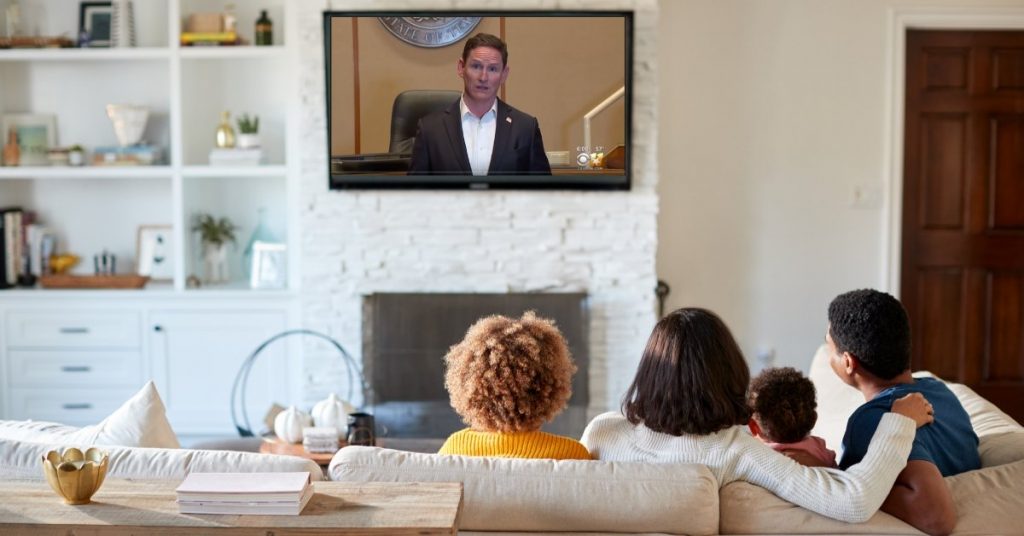No doubt you will be watching more T.V. than ever during this time at home, and you’re likely to watch many speeches from officials who are giving us vital information and issuing orders to the public. This is an opportunity to practice your skills of rhetorical analysis!
Whether you use SPACECAT, SOAPSTONE, the good old rhetorical triangle, or any other tool from class, you can prepare for that upcoming AP® Language and Composition essay by analyzing the rhetoric of the speeches and announcements we tune in to every day.
Let’s practice by analyzing a speech together. First, a little background on the rhetorical situation:
Speaker: Dallas County Judge Clay Jenkins (elected official who is charged by law to make policies and proclamations affecting public health and safety within the county)
Occasion: Speech given to the public on March 21, 2020 (one day before the much more restrictive Safer at Home order)
Audience: The general public living in Dallas County
Purpose: To notify Dallas County about new restrictions going into effect and prompt changes in the public’s response to the crisis
Exigence: Cases of COVID-19 are on the rise in Dallas County and officials had to put stricter policies in place that require public understanding and cooperation.
As you watch the speech, stop at the time stamps indicated in the chart below and then read the analysis I have written about that segment.
00:15—0:58
Announcement to close personal care businesses
He makes this order clear by providing a list of several examples, and then explains the rationale: these businesses cannot operate while maintaining a six-foot distance with customers. He recognizes the audience’s need to understand the rationale, and to anticipate which businesses will be affected, since he cannot name every kind of business.
0:59—1:36
Announcement that non-essential medical procedures will be prohibited.
Jenkins seems to be talking to the medical personnel rather than the average person. He uses formal, official terms such as “prohibited” and “directed to identify procedures.” He doesn’t give examples, and only briefly notes that this order will help address “emergency needs for redirection of resources.” Here Jenkins is reading the exact language of the legal document and doesn’t interpret or clarify any details for the general public, since the medical personnel will be the ones responsible for complying with this provision.
1:36—2:00
Introduction to the order on limiting the purchase of toilet paper
Jenkins alerts the general audience that he “will spend significant time on this upcoming point,” indicating its importance. He announces there will be a limit on the purchase of toilet paper, and then states that the order “was done in direct consultation with the Retailer’s Association.” Since the retailers agree with this limit, the public will not see this decision as being made solely and arbitrarily by Judge Jenkins. Instead, they will accept, and thus comply, with it because it was set by experts who study the supply and demand of their products.
Jenkins provides another framing comment, balancing the stern and disappointed tone of an authority figure with the inclusive and non-accusatory “us,” stating that this action is being taken because “some of us have not moved from selfishness to sacrifice.” He uses this alliterative and memorable phrase to inspire the audience to take a favorable view of the order he is about to give, and prompt them to evaluate their own behavior.
2:01—2:27
Explanation of the specific details of the limitation
He specifies the limit: no more than 12 roles per purchase. Then he clarifies the details to help shoppers make sense of this law when in the store. By breaking down the mathematical scenarios of different package sizes, shoppers will not have these questions when they are filling their carts. Indeed, Jenkins understands he needs to help people comprehend the 12-roll limit so they know how to follow it.
2:28—3:39
Information about the toilet paper supply
Jenkins shifts from explaining the order to putting people at ease with the situation. He reassures the public by providing details about his direct conversations with toilet paper manufacturers—that they are shifting production to packages of six rolls, which will maximize their ability to supply packages quickly. He also states that manufacturers have shown him pictures of large supplies in their warehouses. He needs to provide this credible, direct evidence to support his claim that there is no problem in the supply chain, but that shoppers’ behavior is the cause for the shortages. He reassures the public as well that this is only a short-term restriction. If people feel confident that more toilet paper will be easy to acquire, they are less likely to panic and buy excessive amounts.
3:40—4:52
Plea to refrain from hoarding groceries
Jenkins then brings back the theme of moving from “selfishness to sacrifice” as he addresses a related issue. Although he notes that there are no limits on other grocery purchases, he makes a plea for human decency by reminding the public of specific circumstances some people face which makes a trip to the store a difficult, costly, and even dangerous action. He draws on the emotions of the audience, calling on them to imagine the frustration, sadness, and fear these people face when they make it to the store and find empty shelves. Here he hopes to influence people’s attitudes, prompting them to behave responsibly and compassionately as they make purchases, and to reinforce the kind of community spirit that will become even more essential if conditions worsen.
Wow, who would have thought there was so much to analyze in a speech on toilet paper! As you watch the rest of the speech (and spoiler alert—he has more to say about toilet paper!), pause every few minutes to think about the speaker’s use of evidence to support his claims, how he demonstrates an understanding of his audience, and how he uses appeals and other effective rhetorical choices to inform and influence his audience. If you use these skills every time you watch the news or even late-night talk shows, you will be sharp and ready come test day. And when you get your awesome AP Lang score back, be sure to send an extra roll of toilet paper to your teacher as a thank you. Hopefully, by that time it will be considered a gag-gift!
Note: According to the College Board, AP exams have not been canceled due to the COVID-19 coronavirus. 45-minute online free-response exams can be taken from home.





